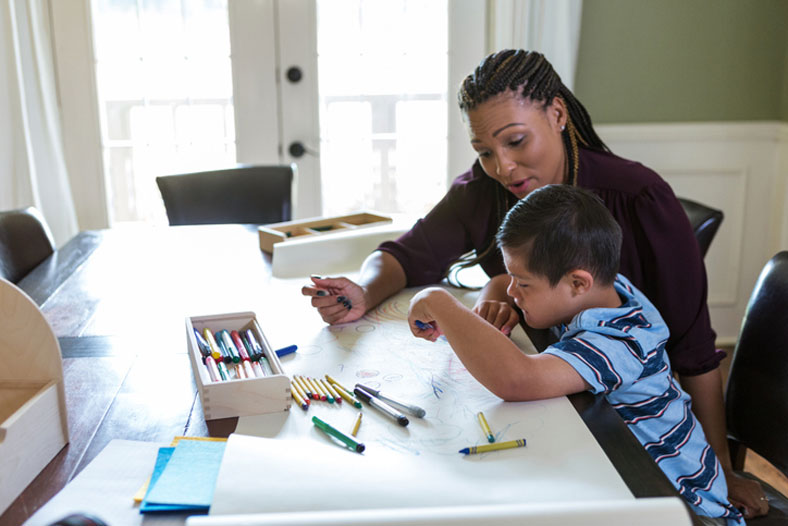Written by Sam Medley

California, the land of golden dreams and innovation, is teeming with diversity, cultural richness, and countless opportunities. But for some, opportunity is a long-forgotten dream. From the bustling city of Los Angeles to the serene valleys of Napa, Californians battle a litany of seemingly insurmountable obstacles — poverty, addiction, mental illness, discrimination, abuse, neglect, and more.
If you feel a burning desire to help people overcome these challenges, social work might be the career for you.
Becoming a social worker, however, requires more than empathy. It often requires years of training, education, and experience. By understanding how to become a social worker in California, you can begin your journey with a clear direction and become the catalyst for change for people across the state.
How to Become a Social Worker in California in Six Steps
In California, the Board of Behavioral Sciences (BBS) is in charge of regulating social workers. They set the rules for how to become a social worker in California, grant licenses to new social workers, and generally enforce professional and ethical standards.
But unlike many states that have multiple types of social work licenses, California only has one: the Licensed Clinical Social Worker (LCSW) license. They also have an Associate Clinical Social Worker (ASW) license, but being an ASW is a stepping stone to becoming an LCSW. It’s not a full license to practice in and of itself. It’s kind of like a training license.
According to the California Chapter of the National Association of Social Workers (NASW), you don’t legally need a license to become a social worker in California unless you provide clinical services. However, private and government employers often heavily favor applicants who have some form of formal training and education. This is especially true for more advanced roles. And considering the state has more child, family, and school social workers than any other state (by almost 26,000 as of May 2022), earning a degree and sharpening your social work skill set may be a good idea.
Step 1: Earn a Bachelor's Degree in Social Work (BSW) or a Related Field
The first step towards becoming a social worker is to obtain a bachelor’s degree in social work (BSW) or a related field. A BSW provides a strong foundation in social work principles and prepares students for entry-level positions in the field. Alternatively, some students choose to pursue a degree in psychology, sociology, or other related disciplines before proceeding to a Master’s in Social Work (MSW) program.
However, learning how to become a social worker in California also means gaining hands-on experience with the diverse people who call the state home. So in addition to taking classes, you will likely be required to participate in a hands-on fieldwork practicum.
Accreditation: Picking the Right School
As you explore different social work programs, it’s important to explore programs that have been accredited by the Council on Social Work Education (CSWE). The CSWE is a national organization that enforces social work education standards. Their main goal is to ensure that all social work students graduate with a consistent set of skills that meet the country’s and employers’ needs.
State regulatory boards, employers, and professional organizations often only accept applicants with degrees from CSWE-accredited programs. In fact, California LCSW requirements say that licensed clinical social workers must have an MSW from or complete advanced coursework through a CSWE-accredited program.
Step 2: Complete a Master of Social Work (MSW) Program
Typically, BSW programs focus on the field’s basic principles. Master of Social Work (MSW) programs are designed to enhance that knowledge. Though earning an MSW isn’t required to become a social worker in California, it is one of the most recognized and sought-after degrees in the field. No matter what kind of social worker you’d like to become, an MSW can enhance your career prospects.

At the Master’s level, you may also have the opportunity to take classes that are relevant to the specific kind of social worker you’d like to become. This might include:
- Psychosocial Aspects of Illness and Trauma
- Case Management and Care Coordination
- Family Dynamics and Caregiver Support
- Elder Abuse and Neglect
- Child and Adolescent Development
- Bullying Prevention Intervention
Each MSW program offers its own combination of specialties and courses, but hands-on practicums are almost always a part of the curriculum. Similarly, each program also has its own admission criteria, but in many cases, students don’t need a BSW to enroll.
Step 3: Gain Supervised Experience as an Associate Clinical Social Worker
After earning an MSW, the next step for social workers in California seeking licensure is applying to become an ASW. As ASWs, future clinical social workers work under the supervision of an LCSW for a total of 3,000 hours. A minimum of 2,000 of these hours must be dedicated to tasks like client assessment, clinical diagnosis, and carrying out treatment in group or individual settings. The remaining hours can be dedicated to things like advocacy, workshops, and research.
You may also be required to take additional courses on topics like suicide intervention, child abuse reporting, and other topics deemed necessary by the state of California. ASWs must also take and pass the California LCSW Law and Ethics Exam before applying for the LCSW exam.
Step 4: Pass the Exam for Licensed Clinical Social Workers in California
Once ASWs have completed their courses, exams, and supervised hours, they’re then eligible to apply to take the Association of Social Work Boards’ (ASWB) Clinical Exam. In California, passing this exam is required before becoming an LCSW.
According to the ASWB’s 2022 Examination Guidebook, the clinical exam is divided into four sections:
- Human Development, Diversity, and Behavior in the Environment
- Assessment, Diagnosis, and Treatment Planning
- Psychotherapy, Clinical Interventions, and Case Management
- Professional Values and Ethics
Step 5: Apply for Licensure
After successfully passing the exam, aspiring clinical social workers can apply for licensure through the California Board of Behavioral Sciences. If accepted, you’ll be equipped to carry out advanced clinical therapies in your own practice or with an existing social work agency.

But before applying, it’s important to ensure you meet all LCSW requirements in California. Applicants must typically:
- Have an MSW from a CSWE-accredited school.
- Complete all additional coursework and supervised experience hours required during their time as an ASW.
- Submit fingerprint scans.
- Pass a criminal background check.
- Pass the ASWB Clinical Exam.
During the application process, you’ll be asked to submit transcripts, exam scores, and other documents that support your eligibility to become an LCSW in the state of California.
Learn more about becoming an LCSW in California.
Why Should I Become an LCSW in California?
Not all social workers in California need a license. In fact, the California Chapter of the National Association of Social Workers says the state only requires LCSWs to have licenses. So if you’ve already earned a BSW, an MSW, and found a job, what’s the point in going any further?
As an LCSW, you’ll be equipped to provide crucial mental health services other social workers in California legally can’t like:
- Clinical Assessment. Like other types of mental health professionals, LCSWs have the expertise to conduct comprehensive clinical assessments, including diagnosing mental health disorders and assessing the impact of psychosocial factors on an individual’s well-being.
- Advanced Clinical Interventions. Along with diagnosing serious mental health conditions, LCSWs can deliver a wide range of evidence-based therapeutic interventions, such as cognitive-behavioral therapy, psychodynamic therapy, family therapy, and more.
- Private Practice. LCSWs have the autonomy to establish and run private practices, offering mental health services independently. Other social workers may need to work under the supervision of licensed clinicians or within agency settings.
- Clinical Supervision. LCSWs are qualified to provide clinical supervision to Associate Clinical Social Workers (ASWs) who are pursuing their clinical licensure.
Being able to provide these services can expand your career options. But just as importantly, it can help you address one of California’s most pressing problems: mental healthcare access.
According to the California Health Care Foundation, only about a third of adults in the state battling mental illness get treatment. That same statistic applies to children with acute depressive symptoms.
The reasons behind this grim reality range from a shortage of qualified mental health professionals to stigma to the rising costs of healthcare in general. As an LCSW, you can help reverse this trend and be a beacon of hope for those struggling silently in your community.
Step 6: Fulfill Continuing Education Requirements
LCSWs in California must renew their licenses every two years. Within those two years, LCSWs must acquire 36 continuing education (CE) units. The CE units should be relevant to the practice of social work and may include courses on social work-related topics like cultural competence, clinical interventions, and license reciprocity. Six hours of CE units must be devoted to law and ethics.
How Long Does It Take To Become a Social Worker in California?
Now that you’ve learned how to become a social worker in California, you’re likely asking yourself, “How long does this whole process take?” The answer depends wholly on your goals and where you are on your journey.
A BSW typically takes about four years to complete. An MSW takes another two to three years. If you train to become an LCSW, that might add on another two years for a total of eight to nine years.
However, if you already have a BSW and have been a practicing social worker in California for a few years, you might qualify to enroll in an accelerated one-year MSW program.
But no matter your path, learning how to become a social worker in California is the first step in making sure people across the state get the help they need and deserve. Whether you’re called to work with inner-city children or isolated seniors in the state’s more rural areas, you stand to make a difference.
What Skills Does a Social Worker Need?
New social workers often have a common goal: to help people. But how do experienced professionals actually accomplish that task? Here are a few skills you’ll sharpen and develop as you learn how to become a social worker in California.
Empathy and Compassion
Social workers must demonstrate empathy and compassion to build strong relationships with clients and understand their unique circumstances and challenges.
Active Listening
Active listening allows social workers to fully comprehend clients’ concerns and perspectives, which is essential for providing appropriate support and interventions.
Communication
Effective communication skills are vital for social workers to convey information clearly, engage in therapeutic conversations, and collaborate with clients and other professionals.
Cultural Competence
California’s diverse population requires social workers to be culturally competent, respecting and valuing the diverse backgrounds, beliefs, and practices of clients.

Problem-Solving
Social workers need strong problem-solving skills to assess complex situations, identify challenges, and develop effective intervention plans.
Advocacy
Advocacy is a crucial skill for social workers in California to advocate for clients’ rights, access to resources, and social justice issues. Learning how to become a social worker in California isn’t just about addressing individual needs. It’s about learning how to address systemic issues.
Case Management
Social workers should be skilled in case management, coordinating services, and connecting clients to appropriate resources and support systems.
Ethical Decision-Making
Ethical decision-making is fundamental to social work practice, ensuring that social workers act in the best interests of their clients and adhere to professional standards.
Documentation and Record-Keeping
Social workers must maintain accurate and confidential records of their interactions and interventions with clients, adhering to legal and ethical requirements.
Interdisciplinary Collaboration
A huge part of learning how to become a social worker in California is learning how to work with other agencies and professionals. This way, you can connect people with a wide range of services that meet their dire yet complex needs.
Resilience and Self-Care
Social work can be emotionally demanding, and social workers need resilience and self-care practices to maintain their well-being and prevent burnout.
What Kinds of Social Workers Does California Have?
With its vast and varied population, California presents a dynamic landscape for social work professionals to create lasting impacts on the lives of its residents. Aspiring social workers seeking to embark on this noble journey need to understand the different types of social work roles available in the state and how to become a social worker in California to fulfill their calling of helping others and promoting social justice. Here are some of the main types of social workers in California.
Child and Family Social Workers
California’s child welfare system demands dedicated professionals to ensure the safety and well-being of vulnerable children and families. As a child and family social worker, you will work closely with families to offer support, resources, and interventions, ensuring children can thrive in a nurturing environment.

School Social Workers
If you are passionate about fostering academic success and emotional well-being in students, becoming a school social worker may be your calling. Operating within educational institutions, school social workers collaborate with teachers, parents, and administrators to address emotional, behavioral, and social issues, enabling students to reach their full potential.
Medical Social Workers
Hospitals and healthcare settings in California rely on medical social workers to provide essential support to patients and their families during times of illness or medical crises. These professionals help navigate medical resources and offer much-needed emotional support during challenging periods.
Mental Health Social Workers
The rising demand for mental health services in California calls for dedicated mental health social workers. By specializing in mental health, these professionals connect individuals with resources, therapy, and support programs to address various mental health conditions.
Geriatric Social Workers
The aging population in California requires specialized care and attention, and geriatric social workers cater to the unique needs of the elderly. They offer assistance with aging-related challenges, including healthcare, housing, and financial matters.
Clinical Social Workers
If you aspire to provide therapy and counseling services to individuals, families, or groups, becoming a clinical social worker might be your path. Clinical social workers are equipped with the skills to address mental health concerns, develop treatment plans, and facilitate therapeutic sessions to empower their clients in overcoming emotional and psychological challenges.
Understanding the diverse roles of social workers in California empowers students to pursue the specific path that resonates with their passion and drive to make a positive impact in the lives of others. Knowing how to become a social worker in California will set them on a rewarding journey of service and advocacy for the betterment of society.







